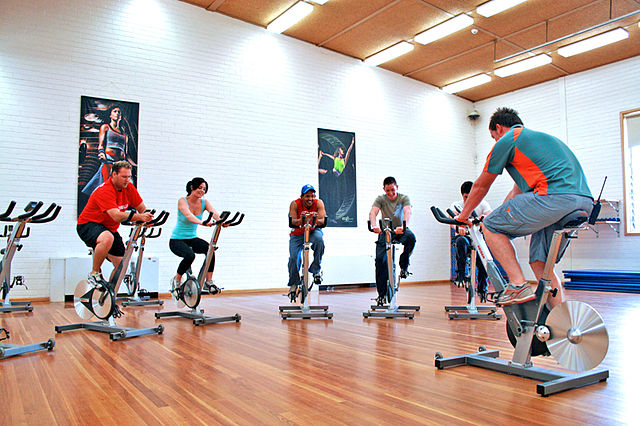In the dimmed studio of my first rhythm cycle class, I might have mistaken it for a nightclub. Lights flicker from purple to blue to green, absorbed by the black metal of the bikes’ core. Amid the music and motion, the instructor shouts affirmations of strength and self-growth. He reveals that the room of adrenaline is pumped by the top chain of career executives—still high performers in yet another aspect of their intense lives.
Watching them, I began to notice patterns beyond the studio. As I looked around, I couldn’t help but connect the wild dots of dissatisfaction that have circulated on the internet about well-being and late-stage capitalism. From witnessing the repetition of day-in-my-life videos of analysts laboring at their desks, to convincing myself that Soul Cycle isn’t soul-sucking, there is enough evidence to make one wonder if corporations have maimed modern wellness.
In today’s economy, boutique spin classes and professional climbing sell the same dream: if you just sweat more, hustle more, connect more, you’ll rise. The promise is transformation through effort, but the game is indeed rigged. What looks like meritocracy is really a system that privatizes responsibility, reinforces hierarchy, and disciplines the body in service to executive control when examined more closely. In other words, this issue stratifies along class lines, is weaponized by corporate culture, and is less about health than attachment to worthiness.
Take the financial hub of New York, home to 41 out of 113 Equinox locations and the upper echelons of career prestige. Clustered in these areas, their flagships boast strategic placement, leveraging the glowing allure of healthiness as a new status symbol through exclusivity. Among their customers, most are well-connected. Moreover, program passes like ClassPass are intended as incentives designed to improve the work-life balance of hard-at-work analysts. Even if studies show corporate wellness programs make employees feel more anxious and less healthy, firms like JPMorgan continue to distribute these alongside meal order credits, effectively engulfing employees’ social time and luring them to extend productive hours by doing already-paid-for activities in proximity to the office. In these gleaming white collar office jobs, your good health is a corporate asset that saves your firm a future healthcare check. In exchange, you offer yourself up, mistaking the wellness perks that form your social capital as required for workplace belonging.
Beyond corporate influence, fitness not only reflects self-care, but also class aspiration. Revolving around a ritualistic cycle, it divides those who have time to dedicate to their physicality, beyond the ability to financially pay. Blue-collar workers who are already exhausted by labor are excluded from this luxury commitment to their bodies. Yet, what you put in isn’t what comes out—both literally and figuratively—as the average $59 monthly fee for a gym membership that Americans pay goes to waste, costing $397 million annually.
Exacerbating this trend, traditional spaces intended for social interactions have declined in cultural capital. Meanwhile, community is instead curated in pre-coordinated groups like wellness classes. Unlike the past decade shaped by spontaneous exchanges with strangers and dancing the night away at clubs and bars, a new generation must seek connection in grueling spin classes. As the perception of the ‘social imaginary’ and norms shift, employees become more paranoid and fear being deemed trashy for their public behavior, especially those hoping to climb the corporate ladder.
This trend points to a deeper existential question: are we as humans trapped in the capitalist loop, attempting to find meaning in everyday life? As our society modernizes, it loses its touch to ground itself, and we no longer know where to put our faith. We become increasingly hyperindependent, choosing to suffer alone in place of asking for help and alienating oneself in ‘a vicious cycle that keeps inducing anxiety’. Some sociologists argue that, as a result of rising secularism, we witness wellness filling the void that religion once held, as we each try to carve our own journey to achieve a higher purpose and power—whatever that may be.
This individual experience connects to the current landscape, particularly since the stratification of wellness activities carries a political charge. To be healthy is the new elite, and each element of your lifestyle becomes entangled in the culture war. Right-wing aesthetics valorize physical optimization and “looksmaxxing.” while left-wing advocacy emphasizes mental health and body acceptance. Where one side critiques victimization in avoidance of responsibility for one’s physique, the other attacks ‘thin and smaller bodies’ as placeholders for rising conservatism. Taken together, with both polarizations often tied to ‘less than palatable politics,’ one must ask: is fitness still an act of agency, or merely a reflection of society’s gaze?
Stepping back, what have we come to associate with ‘self-improvement’? Should it really be a measure of self-worth that quantifies the trajectory of our lives and the paths we walk, in a time of endless worries about a struggling job market and looming recession?Near the end of my 45-minute cycling class, I am reminded of a Black Mirror episode, 15 Million Merits. While I am not literally generating electricity to transform into currency, I cannot help but dystopically reflect on the performative loops my legs have turned. In this cycle I have participated in, thrice a week this summer, have I emerged as a more productive and more worthy being, or simply more disciplined for a system that won’t stop asking for endless performance?
